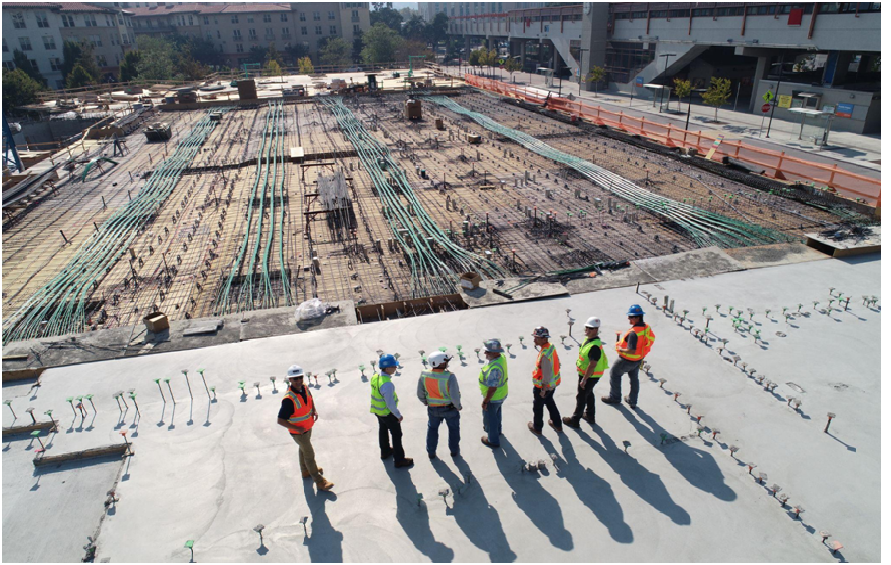
7 Ways Technology Is Being Used By Construction Companies To Add Innovation To Their Services
Technology is constantly changing, which is no different in the construction industry. Construction technology is quickly evolving, which, in turn, drives forward the construction technology industry to be efficient, cost-effective, and safe.
Now, the question isn’t how you’re going to digitize construction projects but how you will keep up with these ever-changing and evolving technologies.
In this post, we’ll walk you through the critical technology trends that are massively impacting the construction industry today:
1. Lidar
Lidar technology lets you measure distances. They can do this by illuminating the target with laser light and measuring the reflection with a sensor.
It gives workers the ability to scan the surrounding worksite and provide real-time, high-resolution 3D images. Doing so makes it possible for workers to do site work even from a distance. It eliminates health and safety risks and injuries in the workplace.
In the same way, this technology can also be used and serve different purposes. It includes the following:
- Land classification
- 3D Printing
- Tunnel surveying
- Drone mapping
- Elevation modeling
- Urban assessment
- Detection of any structural flaws
- Analysis of optic fiber and sewer passag
However, you have to note that this technology can be pretty fragile. Its sensor capability is also limited to conditions like fog, rain, snow, and heavy dust.
Building information modeling (BIM)) integrates AR and IoT technologies, creating an excellent management and workflow planning option. It is a crucial construction technology trend because of its capabilities and opportunity.
For instance, construction managers generate high-tech 3D models of their projects while creating smart workflows based on them, which has elevated the entire construction experience, from planning to building maintenance.
2. Augmented & Virtual Reality
Virtual reality (VR) also has a massive impact on the construction industry. Workers are exposed to confined spaces and work in a safe and secure environment.
VR simulators are also used to train surgeons, pilots, and soldiers. Similarly, it can also be used to train workers in everything from operating excavators and cranes to welding and masonry work.
Another technology that massively improves safety on the construction site is Augmented Reality (AR.) It allows you to create a more detailed safety plan and offer training on heaving equipment using actual equipment on real sites with augmented hazards.
Workers can also have a safety checklist that is specific to the task at hand, as well as secure personal protective equipment. It allows safety managers and trainers to monitor what workers are seeing and walk them through tasks as they work. It also helps that you pick excellent design software for contractors.
3. Personal Protective Equipment (PPE)
While they are less technologically advanced than the others on this list, personal protective equipment PPEs have revolutionized the construction industry regarding health and safety.
In the US, they have the Occupational Safety and Health Act (OSHA.) Meanwhile, worldwide, different countries have also legislated PPEs.
Even with these policies, there’s still an ongoing need for safety on construction sides.
Although construction workers only make up 6% of the labor force, it accounts for over 20% of worker deaths. That’s why there should also be a call for PPE innovation and might include exoskeletons and enhancements in design.
4. Data Collection Apps
Apps are also quite common in the construction industry, and for a good reason. The increased use of smartphones and tablets offers fantastic communication and the ability to work from anywhere.
Data collection allows construction industries to develop faster, more accurate, and quality data from the job site. By incorporating this technology into your current processes, you’ll reap the following benefits:
- Enhanced workflows. You can automate data collection workflows. The submission of one form will trigger another form to be sent. This process will continue until a specific task is completed with the needed sign-offs and data collected.
- Enhanced safety compliance. This facilitates everything from regular tech inspections to a more extensive job safety analysis.
- Instant reporting. A data collection app will help you streamline your reporting. In the same way, you can easily customize reports based on the needs of your business.
- More time savings and reduced data entry errors. The data collection app users reported saving 20 field and admin hours weekly and a 50% reduction in data entry errors.
5. Sensor Data
Sensors and IoT technology have made it possible to quickly and efficiently track the moving parts of your projects.
Many market solutions let you monitor the site condition, track materials in the supply chain, enhance worker safety, and provide better facility management.
6. Artificial Intelligence
Artificial intelligence or AI technology is the ability to come up with decisions independent from human input. Meanwhile, machine learning is the ability of technology to learn from previous experiences and massive data analysis.
These technologies significantly impact construction, wherein highly efficient and intelligent decision-making had a massive effect on both safety and productivity.
7. Building Information Modeling
BIM (Building Information Modeling) is an innovative construction technology shaping the construction industry. It holds plenty of information that is actionable within the model.
It helps decrease changes in orders and enhances field communication and coordination. It’s also very promising. What’s more, it can be used on mobile and taken to construction projects to find out what phase of construction the project is and the details that come with it.
Over to You
Technology is massively shaping the construction industry, constantly searching for ways to innovate and enhance processes. The modern construction industry is more than ready to take the next leap forward with the right tech innovations, equipment, and technology.


